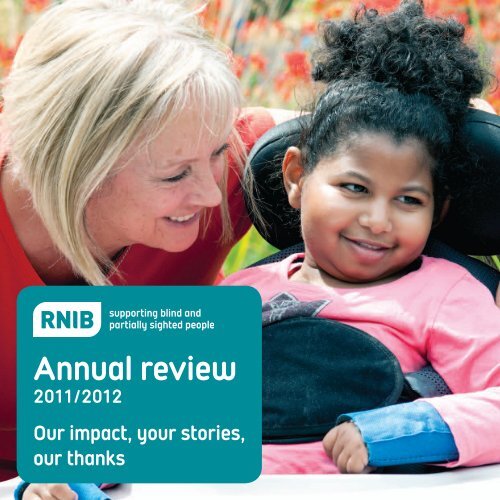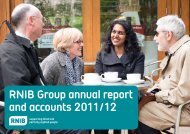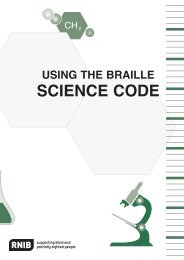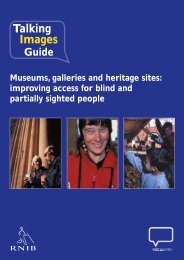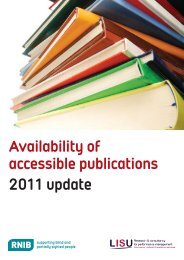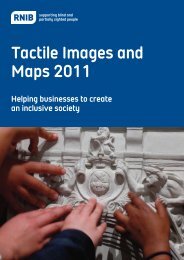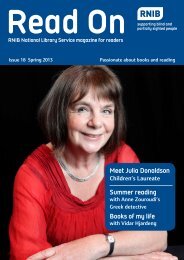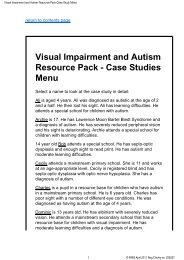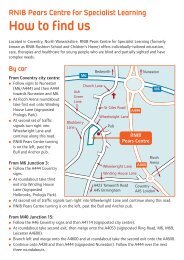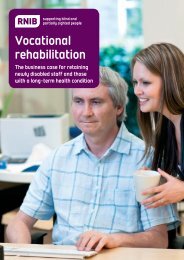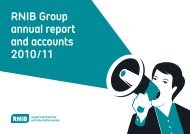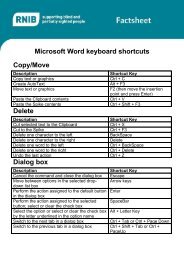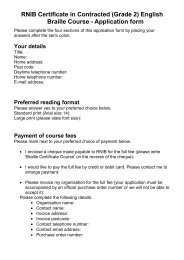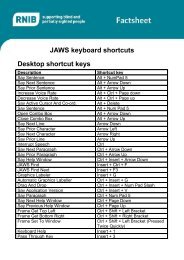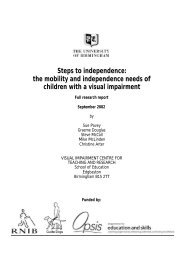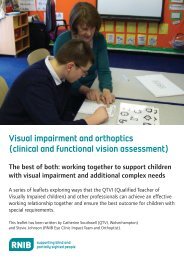Annual review - RNIB
Annual review - RNIB
Annual review - RNIB
Create successful ePaper yourself
Turn your PDF publications into a flip-book with our unique Google optimized e-Paper software.
<strong>Annual</strong> <strong>review</strong><br />
2011/2012<br />
Our impact, your stories,<br />
our thanks
79 per cent of<br />
blind and partially<br />
sighted people<br />
have difficulty<br />
identifying food<br />
and medicine<br />
labels.<br />
2
Contents<br />
Introduction 5<br />
Stopping people losing their sight unnecessarily 10<br />
Supporting independent living 16<br />
Creating an inclusive society 24<br />
Thank you 30<br />
A brief look at our finances 38<br />
How you can help 41<br />
Your audio CD 43<br />
The photograph on the cover was taken at our Sunshine<br />
House School. The residential service at the school<br />
was this year graded “Outstanding” by Ofsted. All of<br />
the photographs in this <strong>review</strong> are of our members,<br />
supporters or the people with sight problems we have<br />
supported during the year.<br />
3
43 per cent of<br />
blind and partially<br />
sighted people<br />
would like to<br />
leave the house<br />
more often.<br />
4
Introduction<br />
This has been an incredibly challenging<br />
year for us as a charity and more<br />
importantly for blind and partially<br />
sighted people across the UK. But<br />
despite the real problems that cuts to<br />
income and services are causing, we are<br />
still very proud of the impact that our<br />
staff and supporters have achieved this<br />
year for people with and at risk of<br />
sight loss.<br />
Kevin Carey, <strong>RNIB</strong> Group Chair<br />
and Lesley-Anne Alexander CBE,<br />
<strong>RNIB</strong> Group Chief Executive<br />
We began the year by empowering blind and partially sighted people to voice<br />
their fears as part of the Hardest Hit campaign to tackle the potential impact of<br />
the Welfare Reform Bill on their lives. This campaign contributed to a notable<br />
success in the reversal of the government’s proposed changes to Disability Living<br />
Allowance (DLA) which would have had a devastating impact on blind and partially<br />
sighted people in residential care. However, as the year draws to a close our<br />
attention is focused on the proposed change from DLA to Personal Independence<br />
Payment (PIP) in 2013. According to the government’s own figures, about half a<br />
million people would lose their entitlement altogether as DLA is replaced by PIP.<br />
Others will qualify for a lower rate than they currently receive.<br />
Introduction<br />
5
The criteria for the new benefit fail to recognise that sight loss is a serious<br />
disability and that you face extensive extra costs if you can’t see, and that these<br />
are ongoing. This will hit blind and partially sighted people particularly hard and<br />
we will campaign tirelessly to ensure that their quality of life is not reduced by<br />
proposed welfare changes that are unfair.<br />
In November three of our residential services working to improve the quality of life<br />
for blind and partially sighted children and young people received “Outstanding”<br />
grades following Ofsted inspections. These fantastic<br />
achievements at <strong>RNIB</strong> Sunshine House Children’s<br />
Home, <strong>RNIB</strong> Pears Centre Children’s Home and The<br />
Stan Bell Centre at <strong>RNIB</strong> College Loughborough<br />
demonstrate our continued commitment to delivering<br />
exemplary education and care services for children and<br />
young people with complex needs that make a real<br />
difference to their lives and the lives of their families.<br />
Our work for young people also achieved a positive<br />
outcome when Ofqual (the exams regulator) ruled<br />
that children could use specially adapted computers<br />
in exams if they can’t read braille or large print – a<br />
huge step in allowing many blind and partially sighted<br />
Three of our<br />
residential services<br />
for blind and<br />
partially sighted<br />
children received<br />
“outstanding”<br />
grades following<br />
Ofsted inspections.<br />
children to have the same access to qualifications as their sighted peers as they<br />
build an independent future for themselves.<br />
Our campaigning for financial independence for those with sight loss has been<br />
tremendously successful this year. Our work to persuade banks to provide talking<br />
cash machines has resulted in Barclays committing to rolling them out in the next<br />
year, and Lloyds Banking Group have committed to make their ATMs talk and will<br />
be targeting 1,500 machines in 2013. This commitment will work across all their<br />
6<br />
Introduction
ands which include Halifax,<br />
Bank of Scotland and Lloyds<br />
TSB. These changes will enable<br />
more blind and partially sighted<br />
people to access and manage<br />
their own money independently.<br />
We ran our first ever “Switch<br />
on to technology” month this<br />
year to provide more blind and<br />
partially sighted people with<br />
the opportunity to get to grips<br />
with new technology such as<br />
computers, eBooks and smart<br />
phones and to learn how to<br />
use this technology to increase<br />
independence in all areas of life. Over 3,700 people took part in regional taster<br />
events and online activities resulting in increased product sales, more queries<br />
to our information and advice services and increased take up of our volunteer<br />
technology support squad which offers practical support to make the most of<br />
technology in the home.<br />
We are also very proud of what our work leading the cross-sector UK Vision<br />
Strategy has achieved this year. For the first time “reducing avoidable sight<br />
loss” will be one of the indicators used by local authorities in England to drive<br />
public health improvement. In the coming years this change will ensure that the<br />
population of blind and partially sighted people in a local area is more accurately<br />
recorded and the required support and prevention services are in place and<br />
properly promoted.<br />
Introduction<br />
7
As well as these significant new impacts, the impact of our more established<br />
services was also something for us to be proud of. Not least the fact that our<br />
National Library Service sent out over one and a half million books in braille,<br />
audio and giant print enabling 46,000 blind and partially sighted people to enjoy<br />
reading, and that our Helpline and information services dealt with over 450,000<br />
enquiries, providing people with reassurance and increased self confidence. Many<br />
of these enquiries were focused on the pressures people were facing due to the<br />
economic climate.<br />
We also empowered people to make positive, practical<br />
improvements to their lives; for example we gave 5,338<br />
blind and partially sighted people specialist support to<br />
claim benefits they are entitled to, amounting to an<br />
incredible £10.2million in additional income.<br />
All of this fantastic impact, and much more besides,<br />
some of which you can find out more about in this<br />
report, would as always not have been possible without<br />
the fantastic generosity of our supporters. To name<br />
We gave 5,338<br />
blind and partially<br />
sighted people<br />
support to claim the<br />
benefits they are<br />
entitled to.<br />
but a few, thank you to our network of volunteers who make up our technology<br />
support squad providing practical support in people’s homes, and to our campaign<br />
supporters all over the UK who have continued to challenge service delivery that is<br />
inaccessible to blind and partially sighted people, to make society more inclusive.<br />
And thank you to everyone who has supported us with a generous gift, including<br />
those who took part in our new annual fundraising event – Read for <strong>RNIB</strong> Day<br />
– which was launched in October, as well as those guests who attended our gala<br />
dinner at The Savoy and were entertained by Sir Tom Jones.<br />
8<br />
Introduction
Looking ahead to this year it is of course a big year for the country as the Olympic<br />
and Paralympic Games come to London. Throughout the year we have been<br />
working hard to make sure that people with sight loss can enjoy the games and<br />
we have succeeded in ensuring that, for the first time ever, live audio description<br />
will be provided for all the sporting events, including the opening and closing<br />
ceremonies. However we must continue to focus on the very real threats that exist<br />
to the lives of blind and partially sighted people and those at risk of sight loss in<br />
the UK. This year we will continue to do all we can in these very difficult times to<br />
improve the quality of life and independence of people with sight problems.<br />
Kevin Carey<br />
<strong>RNIB</strong> Group Chair<br />
Lesley-Anne Alexander, CBE<br />
<strong>RNIB</strong> Group Chief Executive<br />
Introduction<br />
9
There are almost two<br />
million people in the UK<br />
living with sight loss.<br />
10 10<br />
The annual cost of<br />
adult sight loss in the<br />
UK is £2.5billion.
Stopping people<br />
losing their sight<br />
unnecessarily<br />
Over 50 per cent of sight loss in the<br />
UK can be avoided. We do all we can<br />
to reach the people most at risk of<br />
losing their sight with crucial eye<br />
health messages and to ensure that<br />
potentially sight-saving treatments<br />
are available to all.<br />
11 11
Working to eliminate the huge proportion of sight loss<br />
in the UK that is avoidable<br />
This year we have launched projects in five areas of the UK to improve our<br />
understanding of the barriers to eye health that people experience and the ways<br />
to counter these barriers. Although the devastating experience of losing your sight<br />
can happen to anyone we are particularly targeting the most at risk groups and<br />
striving to improve primary and secondary eyecare for people on low income and<br />
from Pakistani and Caribbean populations. The completed research has identified<br />
people’s experiences and concerns and we are now beginning to trial potential<br />
solutions.<br />
Working in partnership to ensure people have a<br />
potentially sight-saving eye test<br />
Sight tests can identify a potentially sight threatening eye condition before any<br />
symptoms are experienced. This is a crucial message in preventing avoidable<br />
sight loss and is why opportunities to work across the eye health sector, such<br />
as National Eye Health Week, are so vitally important and enable us to reach<br />
people we could not reach on our own. During National Eye Health Week 2011<br />
we worked with 16 key partners and reached in excess of 510,000 people who are<br />
either at risk of losing their sight themselves, or work closely with people who are.<br />
12<br />
Stopping people losing their sight unnecessarily
4,500 people were given<br />
one-to-one support about their<br />
eye condition.<br />
260,000 leaflets were<br />
distributed on the most common<br />
causes of sight loss.<br />
Making people more aware of the link between<br />
smoking and sight loss<br />
Smoking doubles the risk of developing age-related macular degeneration, the<br />
UK’s leading cause of sight loss. In fact, the link is as strong as the link between<br />
smoking and lung cancer. For several years we have been warning the public about<br />
the link between smoking and sight loss and as a result of our lobbying we are<br />
delighted that the European Commission has listened to our concerns and formally<br />
adopted a new health warning “smoking increases the risk of blindness” to be<br />
printed on tobacco products.<br />
Stopping people losing their sight unnecessarily<br />
13
Challenging health service providers not to cut<br />
potentially sight-saving treatments<br />
With the Royal College of Ophthalmologists we launched our report “Don’t turn<br />
back the clock” at Parliament in June 2011. It outlined which Primary Care Trusts<br />
across England were restricting access to cataract surgery. Throughout the year we<br />
have protected public safety by challenging NHS healthcare providers who have<br />
offered treatment for wet age-related macular degeneration using an unlicensed,<br />
and cheaper, drug, to amend their policies and in several cases, ensured that<br />
patients are given a meaningful choice of treatments. At the end of the year we<br />
launched our “Save our Sight” campaign through which we will make continuous<br />
efforts to improve access to the diagnosis, treatment and monitoring of the four<br />
leading causes of blindness.<br />
Dennis’s story demonstrates why this work is so vital.<br />
Dennis Sleigh is a 69-year-old singer, songwriter and poet from Derby who had<br />
an early cataract in his right eye that was successfully removed. He has now<br />
developed a cataract in his left eye that causes him problems with glare when<br />
driving, and also when writing his songs and poetry. However, because the<br />
operation on his right eye was successful and his vision in his second eye still<br />
appears to be good he has been told that he cannot have the cataract in his left<br />
eye removed.<br />
“ I have told them that I am struggling with my writing and with<br />
driving. I think that’s what should count, not an artificial rule based<br />
on visual acuity. After all, there is all this talk about a patientcentred<br />
NHS. For me that means that they should fix my eye so I<br />
don’t have to rely on other people for transport and I can continue<br />
doing what I love most.”<br />
14<br />
Stopping people losing their sight unnecessarily
358,000 people are registered<br />
as blind or partially sighted.<br />
Over 50 per cent of sight loss<br />
could have been avoided.<br />
Speaking up for the needs of people with sight loss<br />
to those planning vital services<br />
Tracking the levels of sight loss is key to demonstrating the needs of the<br />
population and therefore opening up better access to sight-saving treatments<br />
for people at risk of losing their sight and life enhancing services for people<br />
living with sight loss. Our work with other organisations to analyse eye<br />
health data and build an evidence base which has been communicated across<br />
the sector has led to the fantastic result that the Public Health Outcomes<br />
Framework for England – which sets out the desired outcomes for public health<br />
and how these will be measured – will now include an eye health indicator<br />
tracking the three major causes of sight loss.<br />
Stopping people losing their sight unnecessarily 15<br />
Stopping people losing their sight unnecessarily
66 per cent of blind and<br />
partially sighted people of<br />
working age are unemployed.<br />
16 16<br />
There are around 40,000<br />
children and young people<br />
living with sight loss in the UK.
Supporting<br />
independent living<br />
We want blind and partially sighted<br />
people to have the opportunity to<br />
remain as independent as possible and<br />
we provide the services, support and<br />
solutions to enable this.<br />
17 17
Supporting people when they are diagnosed with<br />
a sight threatening condition<br />
Our Eye Clinic Liaison Officers (ECLOs) are often the first support people will<br />
receive helping them to come to terms with losing their sight. ECLOs gave support<br />
to over 17,500 people when they were first told they are losing their sight. During<br />
the year we have increased the number of eye clinics where this vital support is<br />
available, as well as further developing the expert nature of the support through<br />
training and development opportunities for ECLOs.<br />
Improving the opportunities for blind and partially<br />
sighted children to fulfil their potential<br />
We secured a major step forward in access to qualifications for blind and partially<br />
sighted pupils this year when, as a result of our lobbying, Ofqual (Register of<br />
Regulated Qualifications) ruled that from September 2012 children who could<br />
not use braille or large print would be able to use a computer and screen reader<br />
in exams. We have also launched the “Load2Learn” project with Dyslexia Action<br />
which will result in 1,000 accessible text books and 700 accessible images<br />
becoming immediately available for children and young people to use.<br />
18<br />
Supporting independent living
17,600 people were given<br />
support and advice when they<br />
were diagnosed with sight loss.<br />
Over 1.6 million talking books<br />
were sent to blind and partially<br />
sighted people.<br />
Improving the quality of life of<br />
children at <strong>RNIB</strong> Pears Centre<br />
<strong>RNIB</strong> Pears Centre for Specialist Learning (formerly<br />
<strong>RNIB</strong> Rushton School and Children’s Home) in Coventry<br />
offers individually-tailored education, care and therapies<br />
to young people who are blind or partially sighted and<br />
have complex needs. The rebuilding of the school and<br />
children’s home has now been completed and all the<br />
new buildings are now in use. In November 2011 the<br />
children’s home was awarded an “outstanding” grade at<br />
an Ofsted inspection.<br />
“<strong>RNIB</strong> Pears Centre has had<br />
an incredible impact: the<br />
teaching has brought new<br />
life into Nadia and she has<br />
developed independent<br />
living skills. She has made<br />
major strides which has had a<br />
positive impact on her parents<br />
and siblings as well. We are<br />
very grateful to <strong>RNIB</strong> Pears<br />
Centre for all their efforts<br />
and support.”<br />
Qayyum, Nadia’s dad<br />
Supporting independent living<br />
19
Enabling people to retain work when losing their sight,<br />
or to find new employment<br />
Losing your sight should not mean losing your job. Working and earning your<br />
living can be vital to self confidence and independence. We are determined to help<br />
people keep their job when they are losing their sight, and find new work if they<br />
need to. But the shocking fact is that only 33 per cent of blind and partially<br />
sighted people of working age are in employment. This year, through working with<br />
employers and training and supporting blind and partially sighted people, we have<br />
helped 1,164 people to retain their job or to find new employment, and thereby to<br />
build and maintain their confidence.<br />
Finding his feet<br />
Chris Ford, 50, lost his sight in 2008 as a result of an assault. He took part in<br />
<strong>RNIB</strong>’s Finding your feet: Steps into work programme in 2012. Before he lost his<br />
sight he was the main breadwinner, now his daughter has taken on that role. It’s<br />
important to Chris to be able to support his family.<br />
“ <strong>RNIB</strong>’s Steps into work programme was the first time I got together<br />
with other people in the same position as me to look at some of<br />
the problems we are facing. I was shocked to find out that only<br />
33 per cent of blind or partially sighted people of working age are<br />
in paid employment. I’d like to retrain in counselling. Speaking to<br />
people on Steps into work helped me see it might be right for me<br />
and I think I would be good at it.”<br />
20<br />
Supporting independent living
Our Helpline dealt with 450,000<br />
enquiries during the year.<br />
We identified £10.2million in<br />
unclaimed benefit entitlements for<br />
blind and partially sighted people.<br />
Helping people to manage the potential impact on<br />
their lives of cuts to services and benefits<br />
This year as cuts to services and benefits begin to become reality we have seen<br />
an increase in the complexity of the enquiries received by our Helpline as<br />
people try to get to grips with the changes that will have such an impact on<br />
their lives. We gave 5,338 blind and partially sighted people specialist support<br />
to understand and claim the benefits they were entitled to. This work identified<br />
an incredible £10.2million in previously unclaimed benefits. We have also<br />
worked with parents, carers and professionals to try to maintain services where<br />
there have been plans to reduce or remove support that has previously been<br />
available to blind and partially sighted children.<br />
Supporting independent living 21
Fighting to ensure blind and partially sighted people receive<br />
the services and support to which they are entitled<br />
We are determined to protect the entitlements of blind and partially sighted people and ensure<br />
that vital services and support can be relied upon now and in the future.<br />
The recommendations within the Welfare Reform Bill posed real threats to blind and partially<br />
sighted people, which is why we helped organise the largest mobilisation of disabled people ever<br />
to lobby MPs in Parliament over welfare reform. Hundreds of blind and partially sighted people<br />
were part of the 8,000 disabled people to lobby Parliament last May as part of the Hardest<br />
Hit march. Regional events followed in October attended by 5,000 people and our Hardest Hit<br />
Christmas card was signed by 23,000 people before being delivered to 10 Downing Street.<br />
This unprecedented lobbying led to 87 per cent of MPs being contacted and 27 per cent being<br />
visited, and MPs and government being left in no doubt that the challenges and additional costs<br />
faced by blind and partially sighted people needed to be reflected in the new benefit.<br />
Early in the year we were delighted that the proposals published by our Vice-President Lord Low,<br />
which were based on the personal mobility needs of blind and partially sighted people, led to the<br />
government reversing its decision to make blind and partially sighted people in residential care<br />
ineligible to the additional mobility component of Disability Living Allowance (DLA). But now we<br />
are faced with a new threat to the independence of blind and partially sighted people.<br />
The government’s plans to replace DLA with Personal Independence Payment (PIP) will remove<br />
tens of millions of pounds from blind and partially sighted people. The criteria for the new benefit<br />
fail to recognise that sight loss is a serious disability and that you face extensive extra costs if you<br />
can’t see and that these costs are ongoing. This year we will work hard to challenge these plans<br />
and to protect the entitlements of blind and partially sighted people.<br />
Find out how you can help blind and partially sighted people<br />
by supporting our PIP campaign at rnib.org.uk/pip<br />
22<br />
Supporting independent living
Why Lizzie supported<br />
the Hardest Hit<br />
Lizzie Anderson from Northampton felt<br />
very strongly about the need to go along<br />
and take a stand,<br />
not only for herself<br />
but for others too.<br />
“I wanted to go on the march on behalf of people who probably couldn’t go<br />
because we can’t get meaningful jobs, all we can get is voluntary work.<br />
That’s the reason why I’ve done it. And to have funding for direct payments<br />
that most disabled people need because a lot of us are having to pay for<br />
transport and personal care.<br />
One of the things I’m really going to be affected by these cuts is not being<br />
able to take so many taxis which is in effect independence for me. The<br />
reason I use these taxis is to get to my music lessons, my job interviews<br />
or to the doctors. A lot of us have got this money because we need it, not<br />
because it’s a luxury that the state decides to give us.”<br />
Supporting independent living<br />
23
60 per cent of blind and<br />
partially sighted people need<br />
help to get out of the house.<br />
24 24<br />
75 per cent of blind and<br />
partially sighted people<br />
need help to go shopping.
Creating an<br />
inclusive society<br />
We work with industry and service<br />
providers to improve the travel,<br />
shopping and banking experiences<br />
of blind and partially sighted people<br />
as well as developing better ways to<br />
read, watch television and get the<br />
most from technology.<br />
25 25
Challenging service providers to consider the needs<br />
of people with sight problems<br />
Often a little thought or a minor adjustment can turn an inaccessible service into<br />
one someone with a sight problem can use independently. With our network of<br />
campaign supporters we have made challenges to 103 shopping, banking and<br />
payment systems and 151 transport services and pedestrian environments. Our<br />
“Talking ATMs” campaign has led to Barclays promising to roll them out across<br />
the UK in the next 12-18 months, and Lloyds Banking Group have committed<br />
to make their ATMs talk and will be targeting 1,500 machines in 2013. This is<br />
an absolutely amazing success which will have a huge impact on the lives of<br />
people with sight problems. On the shopping front, as a result of working with<br />
us, Debenhams launched their UK-wide personal shopping service for blind and<br />
partially sighted people.<br />
Making online services easier for blind and partially<br />
sighted people to use<br />
The internet is becoming a necessary tool by which to access the information,<br />
products and services that we need in day to day life. However much of the<br />
content remains inaccessible to blind and partially sighted people, creating barriers<br />
to gaining employment, managing money and even travelling independently.<br />
Through providing information and advocacy on accessibility and engaging<br />
industry, we have influenced ten sites to make changes so that blind and partially<br />
sighted people can access them independently, including The Guardian, Barclays,<br />
BMI and Audible, and we are in discussions with fifteen others including National<br />
Rail Enquiries and the Home Office.<br />
26<br />
Creating an inclusive society
We have challenged over 100<br />
shopping, banking and payment<br />
systems that are inaccessible to<br />
blind and partially sighted people.<br />
We supported 34 transport<br />
providers to improve the<br />
service they offer to people<br />
with sight problems.<br />
Improving mobile phone and television choices for<br />
people with sight problems<br />
Television is a vital source of information for people with sight problems. Before<br />
the UK went through the digital switchover we developed the Smart talk speaking<br />
set top box in partnership with Goodmans. March saw the launch of another world<br />
first when our work with Panasonic culminated in the launch of the first talking<br />
TV, and we worked with broadcasters to increase the amount of audio description<br />
available. We have worked to build strong relationships with the major mobile<br />
phone manufacturers to the extent that they now consult us on the accessibility<br />
of the phones they are producing. This year we have seen the release of new<br />
products from Nokia and Vodafone that people with sight problems can more<br />
easily use, and just as importantly, can buy on the high street.<br />
Creating an inclusive society<br />
27
Increasing the confidence of blind and partially sighted<br />
people to get out and about<br />
Being able to travel confidently and independently is crucial to avoid the potential<br />
isolation that sight loss can lead to. But independent travel is a challenge for blind<br />
and partially sighted people and many feel trapped at home. This is why we do all<br />
we can to ensure transport systems are as easy to use as possible for people with<br />
sight problems, and that the public environment is welcoming. We are working<br />
with transport providers to highlight good practice and we supported 34 transport<br />
service providers to introduce practical changes to make getting out and about<br />
easier for blind and partially sighted people.<br />
Empowering people to make the most of technology<br />
and increase their independence<br />
Technology is continuing to open up new opportunities for people with sight<br />
problems to maintain their independence, whether through computers, mobile<br />
phones, television, eBooks or radios. But we understand that realising these<br />
opportunities is not always easy and we are determined to help blind and<br />
partially sighted people get the most out of technology. We brought people closer<br />
to these technology solutions with our first ever “Switch on to technology month”<br />
in November 2011 when around 400 people attended our taster events and many<br />
more read our beginners’ guides to the benefits technology can bring. During the<br />
year our home visiting technology support squad gave over 3,500 people help in<br />
getting to grips with new technologies.<br />
28 Creating an inclusive society
Kelci’s story<br />
When Norfolk County Council announced<br />
that they were cutting free travel for<br />
blind people local campaigner Bernie<br />
Reddington decided to act. Bernie took<br />
leading council members on a bus trip<br />
wearing sim specs so they could gain<br />
an understanding of what it was like to<br />
use buses when you have sight loss. This<br />
trip was a crucial factor in the council<br />
reversing their decision. This is vitally<br />
important to many residents such as<br />
Kelci Monaghan, who is deaf and blind.<br />
“ Travelling for me will be much easier now that I don’t<br />
have to worry about what time I leave and can have a<br />
companion with me. Before, I never knew how much<br />
money to give to the driver and couldn’t tell when I’d<br />
reached my stop because I can’t see or hear. Thank you<br />
to the council for giving me back the support I need to<br />
travel independently – I’m over the moon.”<br />
Creating an inclusive society<br />
29
We have benefited from<br />
the support of over 3,700<br />
volunteers this year.<br />
30 30<br />
Over 30 per<br />
cent of <strong>RNIB</strong>’s<br />
work is made<br />
possible thanks<br />
to gifts people<br />
leave us in<br />
their Will.
Thank you<br />
Without the volunteers who help<br />
deliver our vital services, the donors<br />
who help fund these services and our<br />
campaign supporters who help make<br />
our voice louder we would not be able<br />
to achieve all we do.<br />
31 31
We are honoured to have the support of some remarkable individuals. We are indebted to our<br />
Patron Her Majesty The Queen; to our President of 25 years who stepped down this year, His<br />
Grace the Duke of Westminster; and to our new President Dame Gail Ronson, as well as to our<br />
Vice-Presidents:<br />
Sir John Beckwith CBE<br />
The Rt Hon David<br />
Blunkett MP<br />
Richard Brewster<br />
Professor Ian Bruce CBE<br />
Jeremy Bull<br />
32<br />
Dr Haruhisa Handa<br />
Dr Euclid Herie<br />
Lady Jarvis<br />
Penny Lancaster-Stewart<br />
Lord Low of Dalston CBE<br />
Sir Mike Rake<br />
Dr Dermot Smurfit<br />
Rod Stewart CBE<br />
The Rt Hon the Earl of<br />
Stockton<br />
Sir Duncan Watson<br />
We’d like to say a heartfelt thank you to the many individuals, companies and trusts that have<br />
supported us this year. Without your support we could not have achieved what we have. We can’t<br />
possibly name you all but here’s a list of those who have contributed significantly to our cause.<br />
3 Mobile<br />
Accor Services<br />
Ada Hillard Charitable Trust<br />
Miss Agnes H Hunter’s Trust<br />
Ahmadiyya Muslim Youth<br />
Association UK<br />
Alcon UK<br />
All or Nothing Scooter Club<br />
Allergan<br />
AMW Charitable Trust<br />
The Ana Leaf Foundation<br />
The Arbib Foundation<br />
Lady Ashcroft<br />
Awards for All<br />
Thank you<br />
B&P Glasser Charitable Trust<br />
Ballymoney Ladies<br />
fundraising group<br />
Bayer Group<br />
BBC Children in Need<br />
The John Beckwith<br />
Charitable Trust<br />
Belfast Association for the<br />
Blind<br />
The Berkeley Foundation<br />
Big Lottery Fund<br />
Billmeir Charitable Trust<br />
The Black Heart Foundation<br />
The Booker Prize Foundation<br />
Boots D&A<br />
Mr and Mrs Ronald Boschetto<br />
Brian Mercer Charitable Trust<br />
Brian Whittle<br />
Brownlie Charitable Trust<br />
BSkyB<br />
BT PLC<br />
Mr Jeremy Bull<br />
Burwood Trust<br />
Butcher & Harrison<br />
Carmen Butler-Charteris<br />
Charitable Trust<br />
The Catherine Cookson<br />
Charitable Trust<br />
Continued on page 34 ➜
Brian’s story<br />
Brian has been volunteering for <strong>RNIB</strong><br />
since 2006. Brian is an incredibly<br />
dedicated and committed volunteer and<br />
is responsible for collecting donations<br />
from our Sooty boxes in nearly 500<br />
sites all over Lancashire. This year Brian<br />
reached the incredible milestone of<br />
having collected £100,000 to support<br />
blind and partially sighted people.<br />
“ It’s very interesting and<br />
every time you go out you<br />
don’t know what you will<br />
find! I particularly enjoy<br />
building a relationship with<br />
site owners and getting<br />
them to encourage their<br />
customers to donate to <strong>RNIB</strong>. We need more<br />
volunteers to help <strong>RNIB</strong> to continue its vital<br />
work. I’ve encouraged my friends in the past<br />
and would encourage anyone to give it a go.”<br />
We need you!<br />
If you would like to<br />
volunteer your time<br />
to help <strong>RNIB</strong> support<br />
blind and partially<br />
sighted people call<br />
0845 603 0575<br />
or visit rnib.org.uk<br />
Thank you<br />
33
Cecil Rosen Charitable Trust<br />
Coca Cola Foundation<br />
Coleraine Inner Wheel<br />
Constance Travis Charitable<br />
Trust<br />
Creative Scotland<br />
The Peter Cruddas<br />
Foundation<br />
Cushendall Golf Club<br />
Mrs Lisa Dennis<br />
Department for Children,<br />
Education, Lifelong Learning<br />
and Skills<br />
Department for Education<br />
Department for Employment<br />
and Learning<br />
Department of Health<br />
Richard Desmond<br />
Edenred<br />
Graham Edwards<br />
Eric Westbrook<br />
Euro-Matic Foundation<br />
European Social Fund<br />
The Lord and Lady Fellowes<br />
of West Stafford<br />
Lord and Lady Fink<br />
Mr and Mrs Keith Freedman<br />
Tony Gallagher<br />
34<br />
Thank you<br />
GC Gibson Charitable<br />
Settlement<br />
Gerry Allen<br />
Glasgow City Council<br />
Evelyn and David Green<br />
Dr Handa, Chairman,<br />
Worldwide Support for<br />
Development<br />
Lord Harris and<br />
Lady Harris DBE<br />
Henry Hinde Junior School<br />
Her Majesty’s Revenue and<br />
Customs<br />
Heritage Lottery Fund NI<br />
Hugh Fraser Foundation<br />
Mr Ian Reid<br />
International Doghouse Club<br />
Blue Lamp Kennel<br />
J G Graves Charitable Trust<br />
The J H F Green Trust<br />
John Atcheson Foundation<br />
John Scott Trust<br />
Karnival<br />
Miss Kathleen Beryl Sleigh<br />
Charitable Trust<br />
Isaac and Myrna Kaye<br />
Lennox Wyfold Charitable<br />
Trust<br />
Lloyds TSB Foundation<br />
L’Occitane<br />
Lorraine Clarke<br />
Loughborough University<br />
LTCAS<br />
Makinson Cowell Ltd<br />
Man Group PLC Charitable<br />
Trust<br />
Manchester City Football Club<br />
Mr and Mrs Harvey McGrath<br />
Ruth McIntosh<br />
Dr and Mrs Samad Munshi<br />
The John R Murray Charitable<br />
Trust<br />
Museums, Libraries and<br />
Archives Council<br />
Nexen Petroleum UK Limited<br />
Next PLC<br />
NHS Fife<br />
NHS Leeds<br />
Normanby Charitable Trust<br />
Northwood Charitable Trust<br />
Novartis<br />
O2<br />
Mr and Mrs Matthew Orr<br />
O’Sullivan Family Charitable<br />
Trust<br />
Panasonic<br />
Pears Foundation<br />
Continued on page 36 ➜
Dave’s story<br />
Last year, Dave Cowell was diagnosed<br />
with myopic retinal deterioration. This<br />
diagnosis and the rapid deterioration of<br />
Dave’s sight meant that he had to give<br />
up his job as an HGV driver. Dave found<br />
the help <strong>RNIB</strong> gave him vital in coping<br />
with this dramatic change to his life. As a<br />
means of giving something back to <strong>RNIB</strong><br />
Dave completed a 300 mile tandem bike<br />
challenge from London to Paris in 3 days,<br />
and raised over £5,500 for <strong>RNIB</strong>.<br />
“ I have a wife and four<br />
children so you can<br />
imagine the effect this had<br />
on me and my family. I had<br />
no idea what to do next so<br />
I contacted the <strong>RNIB</strong> not<br />
really knowing what if<br />
anything you could do to help. The support,<br />
advice and information proved to be invaluable<br />
and has helped us enormously.”<br />
This year our<br />
supporters raised<br />
almost £400,000 by<br />
participating in events<br />
such as the London to<br />
Paris bike ride.<br />
Thank you<br />
35
The Jack Petchey<br />
Foundation<br />
P F Charitable Trust<br />
Philip and Marjorie Robinson<br />
Charitable Trust<br />
Phoenix Natural Gas<br />
Polegrove Bowls Club<br />
Mr and Mrs Paul Polman<br />
Charlie Porter<br />
PricewaterhouseCoopers<br />
Prue Ruback<br />
Qualcomm Incorporated<br />
Quiz League of London<br />
Mrs Ray Graham<br />
The Joseph and Lena Randall<br />
Charitable Trust<br />
Ranmore Charitable Trust<br />
Research in Motion<br />
Mr David Richards and<br />
Dr Ann MacGregor<br />
<strong>RNIB</strong> Belfast Ladies<br />
Committee<br />
Robertson Trust<br />
The Gerald Ronson<br />
Foundation<br />
Rowan Charitable Trust<br />
The Royal Bank of<br />
Scotland<br />
Edmond J. Safra<br />
Philanthropic Foundation<br />
Mr and Mrs Ralph Saunders<br />
Mrs Lyn Schlesinger<br />
Mr and Mrs Urs<br />
Schwarzenbach<br />
The Scottish Government<br />
Miss SE Robinson Charitable<br />
Trust<br />
Shared Care Scotland –<br />
Better Breaks<br />
Dr and Mrs Dermot Smurfit<br />
Souter Charitable Trust<br />
Sport Northern Ireland<br />
SSE Energy Supply Ltd<br />
Standard Life PLC<br />
The Steinberg Family<br />
Charitable Trust<br />
Daniel Stewart &<br />
Company PLC<br />
Total<br />
Tring Lions Club<br />
Wales Council for Voluntary<br />
Action<br />
Welsh Government<br />
Women’s World Day of Prayer<br />
Worshipful Company of<br />
Spectacle Makers<br />
WPH Charitable Trust<br />
WT Mattock Charitable<br />
Settlement<br />
Youth Council for Northern<br />
Ireland<br />
A brighter future<br />
About a third of <strong>RNIB</strong>’s work is supported by gifts in Wills so we are hugely grateful to those<br />
people who have supported us in this way. Every penny we are left is used wisely to provide a<br />
brighter future for blind and partially sighted people. You don’t have to be wealthy to make a<br />
difference; legacies of all sizes are vital to our work. If you’d like to know how you can help in<br />
this way please call 0845 600 0313 or visit rnib.org.uk/legacy.<br />
36<br />
Thank you
Shirley’s story<br />
Why I’ve included a gift in<br />
my Will to <strong>RNIB</strong><br />
Shirley is a retired librarian, in 1999<br />
she developed age-related macular<br />
degeneration in both eyes, and was<br />
ultimately unable to read, drive a car or<br />
see people’s faces. Reading had been a<br />
lifelong passion for Shirley, so she was<br />
particularly grateful when she discovered<br />
<strong>RNIB</strong> talking books.<br />
“Talking books allow me to listen in bed, keep up with book groups<br />
and events and sometimes they even add an extra dimension to<br />
a previously loved classic, given by the excellent professional<br />
readers. Thanks to <strong>RNIB</strong> I can go on reading, enjoy a full social life<br />
and maintain my independence.”<br />
Thank you<br />
37
A brief look at our finances<br />
The <strong>RNIB</strong> group of charities focused expenditure on the following<br />
areas of work:<br />
Stopping people losing their sight £3,195,000<br />
Supporting independent living £84,340,000<br />
Creating an inclusive society £9,070,000<br />
Costs to generate funds £14,597,000<br />
Governance costs £1,564,000<br />
Total expenditure £112,766,000<br />
There was an actuarial loss on the defined benefit pension scheme of £16,275,000<br />
There was a net gain on investment assets of £383,000<br />
The <strong>RNIB</strong> group of charities’ resources at 31 March 2012 consisted<br />
of the following:<br />
Unrestricted funds £67,618,000<br />
Restricted funds £26,999,000<br />
Endowment funds £5,636,000<br />
Less pension deficit £11,546,000<br />
This gives total net assets of £88,707,000<br />
38 A brief look at our finances
Our expenditure in focus<br />
75 per cent<br />
Supporting independent living<br />
3 per cent<br />
Stopping people losing their sight unnecessarily<br />
8 per cent<br />
Creating an inclusive society<br />
The <strong>RNIB</strong> group of charities’ income came from the following sources:<br />
Donations and legacies £64,452,000<br />
Investment income £1,079,000<br />
Merchandising and sponsorship £265,000<br />
Income from charitable activities £44,220,000<br />
Other incoming resources £1,582,000<br />
This gave a total income of £111,598,000<br />
And an operating deficit of £1,168,000<br />
These figures are extracted from the full Trustees’ report and financial statement for<br />
the year ending 31 March 2012, as audited by PricewaterhouseCoopers LLP.<br />
If you would like a copy of the full report, available in print, audio, braille and by<br />
email, please contact our Helpline on 0303 123 9999 or email helpline@rnib.org.uk<br />
A brief look at our finances<br />
39
The first ever Read for <strong>RNIB</strong> Day was held<br />
on 14 October 2011 and it got off to a flying<br />
start when we set a new world record with<br />
317 people successfully reading a line each<br />
from an exclusive story by Anthony Horowitz,<br />
“Double Eagle has Landed.”<br />
40<br />
Find out how you can get<br />
involved in this year’s<br />
Read for <strong>RNIB</strong> Day at<br />
readforrnib.org.uk
How you can help<br />
Every day 100 people start to lose their sight. We need your help to provide vital services for<br />
blind and partially sighted people. Do something today and make a difference.<br />
Fundraise – Without financial support from donations and legacies we simply couldn’t<br />
provide many of the products and services that help people find their lives again. There<br />
are many ways you can show your support, such as getting involved in Read for <strong>RNIB</strong> Day,<br />
taking on a challenge or making a one-off donation.<br />
Volunteer – Without volunteers we couldn’t run our services. There are over 100<br />
volunteering opportunities across the UK where you could make a real difference in your<br />
local community.<br />
Campaign – Without active campaigners we could never get changes made to health,<br />
social care, employment and benefits. Join our campaigns on issues that matter to blind and<br />
partially sighted people. Attend a supporter reception to learn more about our vital work and<br />
discover opportunities to get more involved.<br />
Please call today on 0303 123 9999 to find out more or send your details to:<br />
<strong>RNIB</strong>, 105 Judd Street, London WC1H 9NE<br />
I would like to know more about:<br />
Making a regular gift Leaving a gift in my Will <strong>RNIB</strong> Membership<br />
Volunteering Fundraising events Recycling for <strong>RNIB</strong><br />
Products and publications Campaigning Read for <strong>RNIB</strong> Day<br />
Name<br />
Address<br />
Email<br />
Postcode<br />
✁<br />
Please tick this box if you are happy to receive email and other electronic forms of<br />
communication from <strong>RNIB</strong>.<br />
How you can help<br />
41
If you want to make a donation please let us know how much:<br />
£10 £20 £50<br />
Other (Please state amount)<br />
If paying by card please supply the following details.<br />
Type of card<br />
Visa MasterCard Maestro<br />
Other (please confirm)<br />
Card number<br />
Issue number<br />
Start date<br />
Expiry date<br />
Cheques should be made payable to “<strong>RNIB</strong> Charity”.<br />
Gift Aid can make your gift worth even more to us. Please tick the box to confirm that you<br />
have paid, or will pay, an amount of Income Tax and/or Capital Gains Tax for the current tax<br />
year (6 April 2012 to 5 April 2013) that is at least equal to the amount of tax that all the<br />
charities, and Community Amateur Sports Clubs (CASCs), that you donate to will reclaim on<br />
your gifts for the current tax year. By ticking the box you also confirm that you understand<br />
that other taxes such as VAT and Council Tax do not qualify, and that <strong>RNIB</strong> will reclaim 25p<br />
of tax on every £1 that you have given.<br />
Data protection. The personal details you provide will be used solely by <strong>RNIB</strong> and our<br />
authorised agents for research purposes and to advise you of additional opportunities/news<br />
that we think may be of interest. Please tick here if you do not wish this to happen.<br />
42<br />
How you can help<br />
✁
Your audio CD<br />
l Listen to the highlights of our work in 2011/12.<br />
l Find out how our supporters have been making it all possible.<br />
l Hear clips from our member magazine Vision.<br />
Only seven per<br />
cent of books<br />
are available<br />
in large print,<br />
unabridged<br />
audio and<br />
braille, including<br />
titles available<br />
in these formats<br />
as eBooks.<br />
Your audio CD<br />
43
<strong>RNIB</strong> Helpline<br />
For information for you or anyone you<br />
know with a sight problem, contact<br />
our Helpline on 0303 123 9999 from<br />
Monday to Friday between 8.45am and<br />
5.30pm or email helpline@rnib.org.uk<br />
You can also order more copies of this<br />
<strong>review</strong> as well as our range of products<br />
and publications.<br />
Sightline directory<br />
The new Sightline directory lists the<br />
people, organisations and services<br />
especially for blind and partially sighted<br />
people all in one place online. You<br />
can search the directory and discover<br />
who’s there to help both locally and<br />
nationally.<br />
Visit sightlinedirectory.org.uk<br />
to get started with your search.<br />
rnib.org.uk<br />
facebook.com/rnibuk<br />
twitter.com/rnib<br />
You<br />
Tube<br />
youtube.com/rnibuk<br />
©<strong>RNIB</strong> October 2012 Registered charity number 226227<br />
PR12354P


